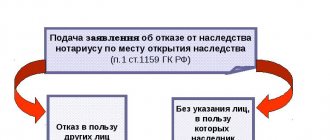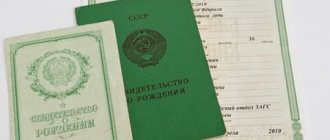Drawing up a will is a very responsible process, but despite this, testators often make mistakes when writing it. An error in a will leads to the recognition of the document as invalid or creates a number of problems for the heirs in the process of receiving the property bequeathed to them.
Errors in a will can be completely different. Often this is an incorrect indication of the initials of the heirs or inaccuracies in the address of the inherited property (house or apartment). In fact, there are many such “mistakes” and they all lead to serious problems that can be avoided by timely detection and correction.
What errors are considered significant?
In accordance with Article 1131 of the Civil Code of the Russian Federation, a will may be declared invalid if there are errors.
But the norm does not indicate specific shortcomings that could lead to this. As judicial practice shows, there are two groups of errors that are most often found in wills. Misprints, typos, punctuation and grammatical inaccuracies are considered minor. They do not affect the heir's receipt of property.
Significant errors that may affect the outcome of the case are listed in the table.
| Error | A comment |
| Distortion of personal data of the heir | Indication of information affecting the identification of a person. Errors may be made in the name, surname, patronymic, and date of birth of the heir. |
| Misrepresentation of data on transferred property | Lack of description of the object, error in the address of the inherited property. |
| Lack of notary signature | There must be a signature of the person authorized to certify the document. |
| Lack of date and place of document preparation | A serious mistake that leads to the invalidity of the will. |
| The testator could not draw up the document | The citizen was in a legally competent state and drew up a will under pressure and threats. |
Reference!
If an error is made in personal data, but other information is complete, the heir can be identified, and the relationship with the testator is confirmed, the court may recognize the will as valid. For example, if an error in the will was made in registration, it will not be significant.
After all, during the time until a citizen enters into an inheritance, he can change his place of registration.
Contents of the certificate
A certificate of inheritance is recognized as a document determining the right of the heir to own the property of the testator. Document form 3.1 is established by Order of the Ministry of Justice of Russia dated December 27, 2016 No. 313.
It should contain:
- Information about the notary (full name, location – notarial district);
- Place of performance of the notarial act;
- A legal norm giving the right to inheritance;
- Information about the heir and testator (full name, place of residence, passport details);
- Information about the real estate (other property) accepted by the heir (its characteristics, including area);
- Indication of encumbrance (if any).
How to correct a mistake if the testator is alive?
The law does not reflect how to correct an error in a document.
This is due to the fact that the document comes into force immediately after signing. But the possibility of correction is confirmed by Article 45 of the “Fundamentals of the Legislation of the Russian Federation on Notaries”. They note that all corrections in notarial documents must be certified accordingly. There are several ways to correct errors that were discovered during the life of the testator. You can enter new data through the court, notary or registry office.
Through a notary
Correction through a notary requires the following conditions to be met:
- the testator is alive;
- the disadvantages are significant.
Errors will not be corrected in previously formulated text. The will will need to be re-drafted.
The new document will cancel the previous will and will be considered valid. In addition, the testator has the right to express a different will in it.
But if the inaccuracies are minor (for example, the apartment number in the heir’s address is incorrect), you can make changes to the text of the will. They are recorded by a notary, about which a corresponding note is made.
Through the court
Correction through the court is made if it is necessary to identify the heir. It is necessary to apply when the will contains incorrect information. For example, in a person’s passport it is written as “Grinev Fedor”, and in a will it is indicated as “Grinev Fedor”. In case of such discrepancies, the court must establish that we are talking about the same citizen.
To begin the procedure, you must submit an application. It is drawn up in the prescribed form. You can use this sample application:
Download a sample will for amending a previously drawn up will
Attention! The court may consider that such inaccuracies do not affect the inheritance. In this case, a determination is made. Based on this, the notary must accept the application from the heir.
Through the registry office
Correction of a will through the registry office, as well as through the court, is not carried out. The authority only issues a document allowing identification data to be clarified.
You must contact the registry office to obtain official information about the testator or heir. With the received paper you need to go to court or to a notary.
Methods for making corrections to a will document
Many people are concerned about what to do if errors are found in the will. The problem is that the procedure for making corrections to a testamentary document is not regulated by law due to the immediate entry into force of the document.
Article 45 of the Notary Law states that amendments to a will must be certified by a notary. The easiest way to put the document in order is to adjust the will during the testator’s lifetime. In this case, you can make a correction in two ways:
- Contacting the notary who drew up the will. The testator has no right to visit another notary. In this case, the amendment must be made only in the presence of the testator.
- Drawing up a new document. In this case, the old will is automatically invalidated.
According to the norms of civil law, the presence of errors in the last name or first name of the heir in the will does not give the right to recognize the document as invalid if the will of the testator expressed in the document is clear and understandable.
If the matter concerns the receipt of funds from a bank, the institution has the right to refuse the recipient of the deceased’s property on the basis of the lack of information in the testamentary document about the existence and degree of relationship. Therefore, before visiting a credit institution, you need to check all the necessary information in the will, otherwise you will have to resolve the issue through the court.
Arbitrage practice
As judicial practice shows, the courts take the side of the heirs indicated in wills.
In accordance with the Civil Code of the Russian Federation, citizens indicated in the document have priority over other heirs. Thus, the Kolomna Federal City Court considered a claim to establish the fact of ownership of the will and restore the missed deadline for entering into an inheritance. The plaintiff noted that he could not inherit under the will due to the fact that the names in the document and the passport did not match.
The court considered the case and decided to satisfy the plaintiff's demands. The will was recognized as valid, and the missed deadline was restored.
Dispute resolution in court
Often, errors in a will are discovered after the death of the testator. Neither the executor nor the employee of the notary's office can determine the severity of the error. Only the court has the right to do this on the basis of an application submitted by an interested party.
If an employee of a notary office does not issue a certificate of inheritance due to errors in a document, he notifies the recipient of the deceased’s property within ten days from the date of making the relevant decision.
You can issue a refusal in one of two ways:
- by appealing a court decision;
- by filing a statement of claim to establish the fact that served as the subject of the dispute.
If during the consideration of the case it is established that the will of the deceased is not questioned even if there is an error, the court will make a decision recognizing the legal force of the document.
Underwater rocks
In the process of receiving an inheritance, some difficulties may arise:
- It is not easy to prove the fact of relationship if there is an error in personal data in the will. If the will immediately states family ties, it is easier to identify the person using a birth certificate or other document from the civil registry office.
- The error may not be in the will, but in the passport. It will be necessary to correct inaccuracies in the identity card when applying to the Ministry of Internal Affairs.
- Not all citizens know where to go to correct the error, and also cannot draw up an application on their own.
Results
Inaccuracies made when drawing up a will vary. When considering each of them, the court takes into account the specific circumstances of the case and determines the degree of its seriousness. Since each case has a number of individual characteristics, it is simply impossible to predict the judge’s decision to recognize the will as valid or, conversely, illegitimate.
Read: Liability for the debts of the testator: are debt obligations inherited?
Challenging a will or invalidating it
Interested parties can challenge the will after the opening of an inheritance case if errors are found in the document and wording is not indicated that the testator was of sound mind when drawing up and signing the document.
In the following circumstances, a will may be declared invalid:
- it was established that the testator was incompetent;
- at the time the will was written, the person was under psychological or physical pressure;
- the document does not contain a notarization or signature of the testator;
- the will is a closed type, it was not drawn up by the testator;
- witnesses were missing or did not meet legal requirements.
Invalid clerical errors and errors cannot serve as grounds for cancellation of the document.
Judicial practice shows that invalidation of a will rarely happens.
Basic information
Once a will is drawn up, it receives notarization. This indicates the following factors:
- on the date of execution of the document, the testator was fully aware of what he was doing and what consequences it would lead to;
- the testator acted at his own discretion, and not under someone else’s pressure.
Practice shows that most often errors occur in the full name of the heirs, in their dates of birth, if the testator does not take a photocopy of their passports with him.
The law prohibits making changes to a completed will. From the moment the document is signed and notarized, it is unacceptable to correct errors in the heir's surname, dates, and addresses.
Errors and invalidity of the will
A declaration of will is declared invalid by a court on the basis of an appeal from a citizen whose property interests have been violated. Filing a claim is not allowed before the opening of an inheritance case. The reason for challenging may be incorrect execution, lack of mandatory wording and nuances with signing, certification and witnesses. The following factors may lead to invalidation:
- Evidence regarding the identity of the testator at the time of drawing up the testamentary disposition:
- incapacity (Article 171 of the Civil Code of the Russian Federation);
- states of lack of control over the actions performed and awareness of their significance (Article 177 of the Civil Code of the Russian Federation);
- exposure to adverse factors or commission under the influence of threat, deception, physical or psychological coercion (Article 178, 179 of the Civil Code of the Russian Federation).
- Absence of a handwritten signature or indication of the reasons why the testator did not sign the will in person (clause 3 of Article 1125 of the Civil Code of the Russian Federation).
- The presence of a closed will, inconsistencies in the execution procedure of which are discovered only when the inheritance is opened, and the notary is deprived of the opportunity to check the document after drawing up (clause 2 of Article 1126).
- Writing without witnesses in situations provided for by law and not certified by responsible persons, whose signatures are equivalent to notarized documents (Article 1127 of the Tax Code of the Russian Federation):
- chief doctors and their substitute medical workers - when the testator is in inpatient medical institutions or in homes for the disabled and elderly;
- captains of ships - when sailing under the flag of the Russian Federation;
- commanders of military units - when stationed in specialized military units far from notary offices;
- heads of correctional institutions - when serving a sentence in places of deprivation of liberty.
Although civil legislation refutes the basis of invalidity due to clerical errors and minor violations of order when the court establishes the absence of their influence on the essence and understanding of the expression of will (clause 3 of Article 1131 of the Civil Code of the Russian Federation), the very fact of insignificance and insignificance will have to be proven. A will may be declared invalid either as a whole or in relation to individual clauses.
Consent or refusal
After examining the provided documents, the registry office employee draws up a conclusion on making changes (and, accordingly, issuing a new certificate) or refusing to correct them.
- The refusal must be made exclusively in writing, and its reason must also be indicated. If they refuse to change your child’s data orally, or you do not agree with such a decision, the actions of the head of the registry office department (he is the one who is authorized to draw up a refusal) can be appealed in court.
- Consent - if, based on your application, a decision is made to change the entry, this will be done only in the registry office in which the certificate was issued. A new certificate will be issued at the place of your application, that is, documents will be sent from the registry office (where the certificate was issued) to the registry office (where they will be handed over to the applicant).
Additional features and nuances
- If the testator suspects that after his death interested parties may try to challenge the will, then he is advised to play it safe. You can film the process of drawing up and notarizing a document on video, invite witnesses (indicating their data in the will, obtaining their signatures), and issue certificates confirming legal capacity and the absence of serious illnesses. In the text of the document you need to indicate all the information about the inheritance: for example, when transferring an apartment, you will need to register its cadastral number, and not just the address and area.
- The testator needs to make sure that the heirs indicated in the document will not be considered unworthy in the future. An unworthy heir is a person who committed a crime against the testator or other recipients of the inheritance, was deprived of parental rights, and evaded caring for the testator.
Without a witness
It is convenient to consider the problem with an example. The notary did not issue a will to a woman related to the testator, who, because of this, filed a lawsuit and went to court. In addition, the legal heir filed a counterclaim to invalidate the document.
The testator prepared the document while he was in the hospital. The plaintiff took it to the notary, but instead there was an assistant on site who recommended printing the text and certifying it with the signature of the head physician of the medical institution. He said nothing about the witness. The testator asked the chief physician to certify the prepared document, and he did so. After this, the heiress took the will again to the notary, but there she was told that she had the right to keep it at home.
When a certificate must be replaced with a new one
To eliminate typos, errors
That is, when there is a technical error or typo in any word or number in a document. The most common errors that are subsequently asked to be corrected are:
- distortion of the child’s first (surname) name;
- incorrectly written month or date of birth of the child;
- incorrectly indicated date of issue of the certificate;
- incorrect information about parents;
- spelling mistakes.
Other reasons
- To make changes due to a change of first name, patronymic, last name for various reasons (both a change of the surname of the parents and the child himself);
- Damage to the certificate, rendering it unusable, lamination, unreadability due to light or other effects (for example, the document has “faded”), getting wet, etc.;
- Adoption or establishment of paternity;
- If the unmarried mother requests that the father's record be changed or removed;
- By court decision (the grounds may be different).
Regardless of the nature and volume of the data being changed, these changes are not made to the certificate itself. A new document is always issued. After reviewing the application, the registry office employee draws up a written opinion on the need for change. Then he makes a corresponding entry in the civil status act, after which a new certificate is prepared.






